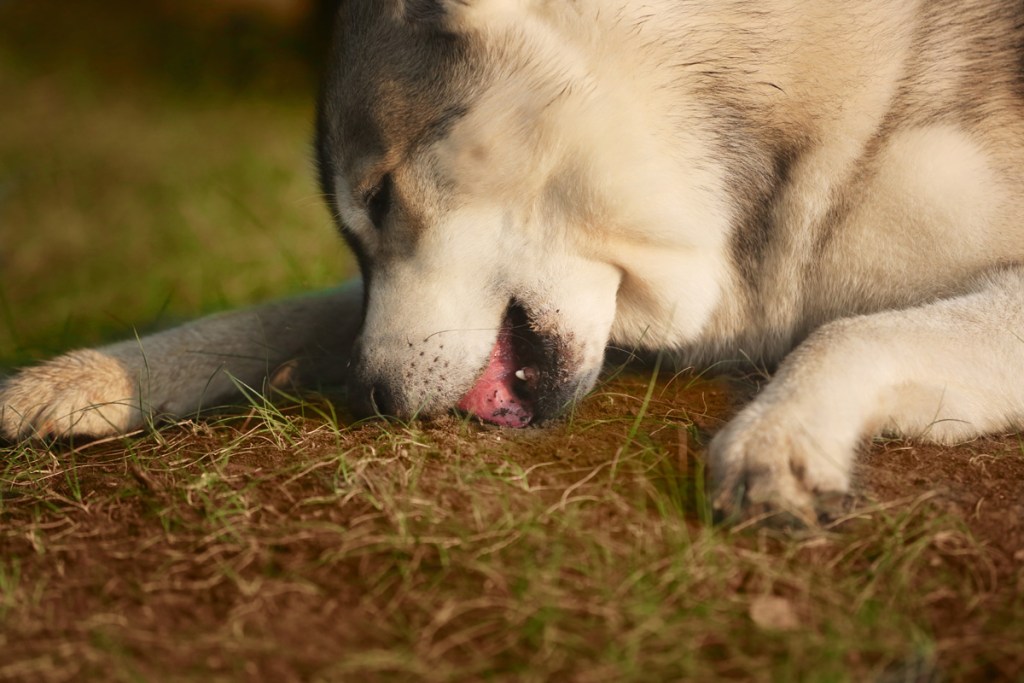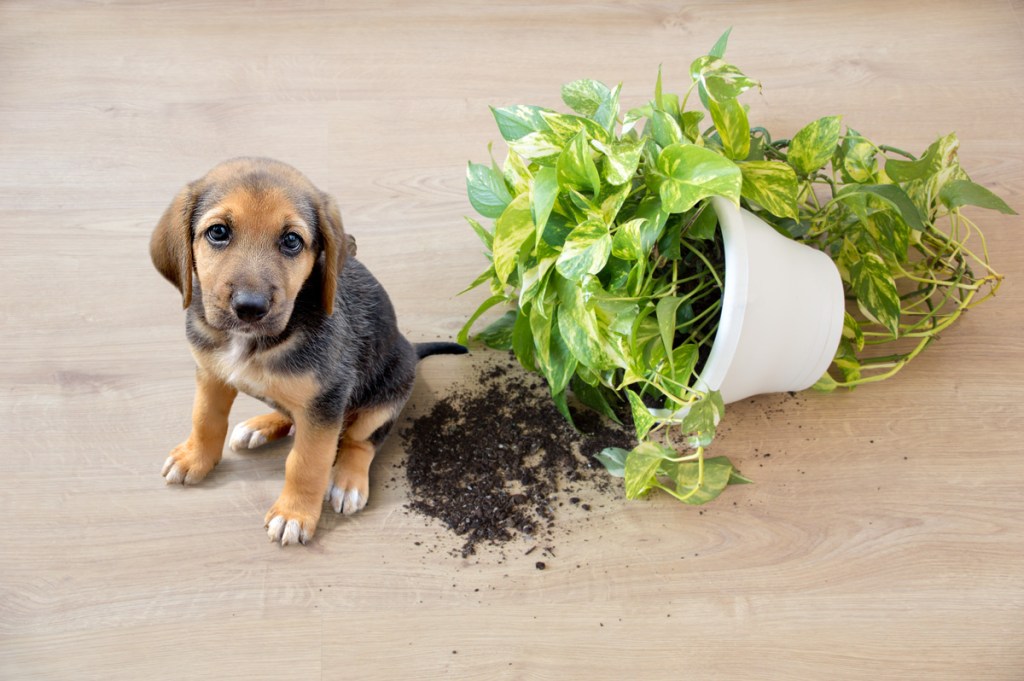If your dog frequently comes in from the outdoors with a dirty mouth, don’t take it lightly. He could be consuming dirt, and that can lead to health problems according to experts at UC Davis School of Veterinary Medicine. Dogs who develop unusual eating habits where they persistently chew and consume nonfood-related items including dirt suffer from a disorder known as pica. But why do dogs eat dirt? Experts say that this eating disorder can be a symptom of an underlying medical problem, stem from behavioral issues, or simply be that a dog is attracted to the smell and taste of the soil. If your dog is a compulsive dirt eater you should discuss the problem with a veterinarian to rule out any serious health issues.

Medical reasons why dogs eat dirt
Anemia
Dogs suffer from anemia when their bodies don’t produce enough red blood cells. And according to PetMD, any anemia, if severe enough, can cause a dog to eat dirt. Anemia can be caused by a variety of things such as hookworms, flea infestations, tick disease, cancer, or bleeding disorders. While it’s more common for puppies to have hookworms, dogs of any age can be exposed to these parasites in the environment or if they are not on a heartworm preventative.
Inflammatory bowel disease
According to an article in Dogs Naturally magazine, when dogs seek out minerals and vitamins found in the soil it could be a signal that they are suffering from inflammatory bowel disease. Known as IBD, this syndrome is caused by a specific reaction to chronic irritation of the intestinal tract. Inflammation in the bowel can lead to bleeding. In the magazine article, veterinarian Judy Morgan says that “…dogs with IBD could be eating dirt because they are trying to get more minerals to help deal with anemia.”
Mineral deficiency
Veterinarian Carol Osborne of Chagrin Falls Veterinary Center and Pet Clinic in Ohio believes that a bad diet may cause a dog to eat dirt. In an article on the veterinary center website, Osborne says, “Dogs have a natural instinct to adjust their diet when they are not getting the nutrients they crave. If your dog is eating dirt for more than a few days, the first step is to check the food label for proper, balanced nutrition, including essential minerals.” Additionally, veterinarian Michelle Burch of Safe Hounds Pet Insurance says that iron deficiencies can also lead to a dog eating dirt and rocks to make up for the deficiency. According to Burch, “Dogs will develop iron deficiency from chronic blood loss, poor diets, or severe hookworm infections.”
Chronic gastritis or stomach upset
Osborne believes that some dogs may eat dirt to soothe an upset stomach. The veterinarian says dogs “may eat dirt to dilute toxic or harmful foods and reduce their impact on the gut.”
Liver disease
In the Chagrin Falls Veterinary Center and Pet Clinic article, Burch says that the most common liver disease that leads to eating dirt and rocks is “hepatic microvascular dysplasia or a liver shunt.” Other symptoms of this disease include vomiting, diarrhea, and weight loss.
Behavioral issues can also cause dogs to eat dirt
Determining the cause of your pet’s angst is an important step in ending dirt-eating, according to UC Davis veterinary experts. This involves careful observation of the eating disorder including its frequency, duration, and time of occurrence. Often, dogs allowed access to the outdoors will eat dirt when not supervised so you may need a video camera to capture the behavior. Veterinary behaviorists say that some dogs, especially puppies and adolescents, may resort to eating dirt out of boredom. If you work long hours, consider hiring a pet sitter to take your dog for a walk or enroll your pooch in a daycare facility. Also, be sure to provide your dog with chew toys to keep him busy when alone.
Separation anxiety can also lead to unwanted behaviors such as abnormal eating behaviors. Mild separation anxiety may be relieved by increasing your dog’s daily exercise and offering interactive toys to provide stimulation when home alone. For more severe cases behavior modification may be needed to help dogs feel comfortable when left alone. Veterinarians can also prescribe anti-anxiety medication to help stressed dogs to relax.
How to stop your dog from eating dirt
In an American Kennel Club article, veterinarian Laurie S. Coger says that the main concern when letting your dog continually eat dirt is impaction of the intestines, which often requires surgery. Other dangers according to Coger include dental damage and obstruction in the throat or elsewhere along the digestive tract. Dogs also may ingest parasites picked up in the soil.

How to stop your dog from eating dirt
There are some actions you can take to prevent your dog from eating dirt including:
- Walking him on a leash where you can supervise his behavior
- Redirecting with positive motivation when he picks up dirt in the yard
- Keeping indoor potted plants out of your dog’s reach
- Blocking access to any favorite dirt-eating spots in the yard
- Using a muzzle to prevent your dog from eating dirt when unsupervised in the yard
- Providing enough exercise and mental stimulation
If you live with a dog who enjoys munching on soil, experts at UC Davis School of Veterinary Medicine advise partnering with a veterinarian to determine the cause of the problem. In addition, a professional behaviorist can develop a training technique to help break your dog’s dirty habit.
Editors' Recommendations
- Why does my dog have a bald patch on their tail? Here are the answers you need
- Looking for signs your dog has ticks? These telltale symptoms mean you have a flea or tick problem
- Xylitol is dangerous for dogs: 10 surprising products that contain it as a hidden ingredient
- Here’s how to treat a dog with itchy paws, starting with finding the cause of paw discomfort
- Is your dog’s breathing problems old age or something else? What to know




